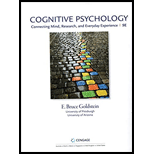
COGNITIVE PSYCHOLOGY - WITH MINDTAP
5th Edition
ISBN: 9781337763455
Author: Goldstein
Publisher: CENGAGE L
expand_more
expand_more
format_list_bulleted
Question
Chapter 13, Problem 13.1-4TY
Summary Introduction
Introduction
Representativeness heuristic is a mental shortcut that involves estimating the probability of an instance being a member of a group or category based on the similarity of the instance to other members of the group. Thus, in this heuristic, the similarity between the cases rather than the probability of the outcome influences judgment.
Expert Solution & Answer
Want to see the full answer?
Check out a sample textbook solution
Students have asked these similar questions
able to help me with this for revision purposes and used reference in APA
Required reading:
• McKevitt, G. (2024, September 2).
https://www.bbc.com/culture/article/20240829-the-life-changing-day-world-war-two-began
What strategies and techniques can social workers use to inform and influence organizational and social policy? What are advantages and disadvantages of various policy change strategies and techniques?
Please cite in text source and list references.
What are three professional best practices that school counselors can implement or can recommend in schools after watching the YouTube video titled “The Effective School Counselor with a High-Risk Teen: Motivation Interviewing Demonstration” (https://www.youtube.com/watch?v=_TwVa4utpII) by MerloLab (MerloLab, 2015)? Please write in a narrative format and include citations.
Chapter 13 Solutions
COGNITIVE PSYCHOLOGY - WITH MINDTAP
Ch. 13 - Prob. 13.1-1TYCh. 13 - Prob. 13.1-2TYCh. 13 - Prob. 13.1-3TYCh. 13 - Prob. 13.1-4TYCh. 13 - Prob. 13.1-5TYCh. 13 - Prob. 13.1-6TYCh. 13 - Prob. 13.1-7TYCh. 13 - Prob. 13.1-8TYCh. 13 - Prob. 13.1-9TYCh. 13 - Prob. 13.2-1TY
Ch. 13 - Prob. 13.2-2TYCh. 13 - Prob. 13.2-3TYCh. 13 - Prob. 13.2-4TYCh. 13 - Prob. 13.2-5TYCh. 13 - Prob. 13.2-6TYCh. 13 - Prob. 13.3-2TYCh. 13 - Prob. 13.3-3TYCh. 13 - Prob. 13.3-4TYCh. 13 - Prob. 13.3-5TYCh. 13 - Prob. 13.3-6TYCh. 13 - Prob. 13.3-7TYCh. 13 - Prob. 13.3-8TYCh. 13 - Prob. 13.3-9TYCh. 13 - Prob. 13.3-10TY
Knowledge Booster
Similar questions
- What are three strategies school counselors use in schools after watching the YouTube video titled: “The Effective School Counselor with a High-Risk Teen: Motivation Interviewing Demonstration” (https://www.youtube.com/watch?v=_TwVa4utpII) by MerloLab (MerloLab, 2015)? Please write in a narrative format and include citations.arrow_forwardWhat are three interventions or programs school counselors can implement in schools after watching the YouTube video titled “The Effective School Counselor with a High-Risk Teen: Motivation Interviewing Demonstration” (https://www.youtube.com/watch?v=_TwVa4utpII) by MerloLab (MerloLab, 2015)? Please write in a narrative format and include citations.arrow_forwardWhat are three methods for dissemination of information that school counselors can use after watching the YouTube video titled “The Effective School Counselor with a High-Risk Teen: Motivation Interviewing Demonstration” (https://www.youtube.com/watch?v=_TwVa4utpII) by MerloLab (MerloLab, 2015)? Please write in a narrative format and include citations.arrow_forward
- What are the three most important knowledge a school counselor can gain from watching the YouTube video titled: “The Effective School Counselor with a High-Risk Teen: Motivation Interviewing Demonstration” (https://www.youtube.com/watch?v=_TwVa4utpII) by MerloLab (MerloLab, 2015)? Please write in a narrative format and include citations.arrow_forwardWhat are the three most relevant principles school counselors need to be aware of watching the YouTube video titled: “The Effective School Counselor with a High-Risk Teen: Motivation Interviewing Demonstration” (https://www.youtube.com/watch?v=_TwVa4utpII) by MerloLab (MerloLab, 2015)? Please write in a narrative format and include citations.arrow_forwardI need help finding 16 research artices on big 5 personality test on a attractiveness of those with tattos an those with out tattosarrow_forward
- I need help with what is evolution to psychology cultural can you describe it in you own wordsarrow_forwardI need help finding 16 research articles on noncomformnitity on attractiviness of a person with tattos an with out tattosarrow_forwardWhat follows the psychoeducational assessment and the role the preschool teacher can play? Use scholarly sources.arrow_forward
- What is psychoeducational assessment, how is it conducted, and why is it more appropriate for assessing the needs of a child with undiagnosed special needs. Use scholarly sources.arrow_forwardI need help finding 16 peer view research articles on japan that talks about the values respect ad group harmony, which explains the people's behavior that can differ in the socieries that differ in there valuing of collectivismarrow_forwardhow to answer these 2 question for revision Required reading: • McKevitt, G. (2024, September 2). https://www.bbc.com/culture/article/20240829-the-life-changing-day-world-war-two-beganarrow_forward
arrow_back_ios
SEE MORE QUESTIONS
arrow_forward_ios
Recommended textbooks for you
 Ciccarelli: Psychology_5 (5th Edition)PsychologyISBN:9780134477961Author:Saundra K. Ciccarelli, J. Noland WhitePublisher:PEARSON
Ciccarelli: Psychology_5 (5th Edition)PsychologyISBN:9780134477961Author:Saundra K. Ciccarelli, J. Noland WhitePublisher:PEARSON Cognitive PsychologyPsychologyISBN:9781337408271Author:Goldstein, E. Bruce.Publisher:Cengage Learning,
Cognitive PsychologyPsychologyISBN:9781337408271Author:Goldstein, E. Bruce.Publisher:Cengage Learning, Introduction to Psychology: Gateways to Mind and ...PsychologyISBN:9781337565691Author:Dennis Coon, John O. Mitterer, Tanya S. MartiniPublisher:Cengage Learning
Introduction to Psychology: Gateways to Mind and ...PsychologyISBN:9781337565691Author:Dennis Coon, John O. Mitterer, Tanya S. MartiniPublisher:Cengage Learning Psychology in Your Life (Second Edition)PsychologyISBN:9780393265156Author:Sarah Grison, Michael GazzanigaPublisher:W. W. Norton & Company
Psychology in Your Life (Second Edition)PsychologyISBN:9780393265156Author:Sarah Grison, Michael GazzanigaPublisher:W. W. Norton & Company Cognitive Psychology: Connecting Mind, Research a...PsychologyISBN:9781285763880Author:E. Bruce GoldsteinPublisher:Cengage Learning
Cognitive Psychology: Connecting Mind, Research a...PsychologyISBN:9781285763880Author:E. Bruce GoldsteinPublisher:Cengage Learning Theories of Personality (MindTap Course List)PsychologyISBN:9781305652958Author:Duane P. Schultz, Sydney Ellen SchultzPublisher:Cengage Learning
Theories of Personality (MindTap Course List)PsychologyISBN:9781305652958Author:Duane P. Schultz, Sydney Ellen SchultzPublisher:Cengage Learning

Ciccarelli: Psychology_5 (5th Edition)
Psychology
ISBN:9780134477961
Author:Saundra K. Ciccarelli, J. Noland White
Publisher:PEARSON

Cognitive Psychology
Psychology
ISBN:9781337408271
Author:Goldstein, E. Bruce.
Publisher:Cengage Learning,

Introduction to Psychology: Gateways to Mind and ...
Psychology
ISBN:9781337565691
Author:Dennis Coon, John O. Mitterer, Tanya S. Martini
Publisher:Cengage Learning

Psychology in Your Life (Second Edition)
Psychology
ISBN:9780393265156
Author:Sarah Grison, Michael Gazzaniga
Publisher:W. W. Norton & Company

Cognitive Psychology: Connecting Mind, Research a...
Psychology
ISBN:9781285763880
Author:E. Bruce Goldstein
Publisher:Cengage Learning

Theories of Personality (MindTap Course List)
Psychology
ISBN:9781305652958
Author:Duane P. Schultz, Sydney Ellen Schultz
Publisher:Cengage Learning